A train is a perfect setting for a story, with its confined space, its forward momentum, its promise of change and adventure. Whether thundering along the Californian coast, spending days staring out at Russian forests and tundra, or blinking as the Japanese countryside whips past too quickly to take in, I’ve been lucky enough to have travelled on trains through some incredible landscapes, but some of my most vivid memories of these journeys are of the people I met, and the odd intimacy that this enclosed world creates.
It is perhaps this enclosed world that has drawn so many writers to make use of trains in their novels. On a train we are at once moving but also somehow suspended in time and space. The carriages become their own community; the normal rhythms and rules of life break down.
My debut novel The Cautious Traveller’s Guide to the Wastelands is set on a fantastical version of the Trans-Siberian Express, crossing a dangerous landscape that threatens the body and unsettles the mind. The powerful Trans-Siberia Company boasts that the armoured train is the only safe means of passage, but the passengers and crew begin to realise that its walls may not be as strong as the Company promises, and as the author of an infamous travel guide warns, there may be a high price to pay for undertaking the journey.
The novel was inspired partly by a memorable journey on the real Trans-Siberian Express, but also by a love of train travel that has been fed by fiction—of peril, romance, and crime on the rails. There are of course the classic train novels of Agatha Christie and others, but I’ve gone for the contemporary here. Putting together this list, I’ve chosen a mixture of genres, including crime, fantasy, historical fiction, and travel writing. But what they all have in common is a sense of adventure, and an exploration of the sometimes contradictory promises of escape and of connection that the railway offers.
Iron Council by China Miéville
Outlandish creatures and gigantic structures have always been a key element in Miéville’s novels, and Iron Council — ‘the perpetual train’ — is no exception. The story is set in the imagined world of Bas-lag, and moves back and forth through time, from the beginnings of train as it sets out to map the land and wipe out its inhabitants to make way for the rails, to the rebellion of the rail workers, and the attempts by a corrupt parliament and militia to destroy such a dangerous symbol of revolution. The ever moving, ever growing train provides great opportunities not only to explore the weird and wonderful landscapes of Bas-Lag, but also the febrile onboard world, with its renegades and ‘Remade’.
The Circus Train by Amita Parikh
The ‘World of Wonders’ is a luxury steam train which is home to a travelling circus. Lena, the daughter of the troupe’s illusionist, uses a wheelchair after contracting polio as a child, and feels isolated from the bright, physical world of the circus. When a Jewish orphan, Alexandre, is discovered on board, Lena finally begins to find friendship — and something more — but her growing happiness is threatened by the outbreak of war. The novel paints a glorious picture of the circus train, but doesn’t shy away from the darkness closing in around it, leaving the reader to confront the changing meanings of the train in 1940s Europe. But it is at its core a hopeful story, and the rails carry its protagonists into a brighter future.
The Highland Falcon Thief by M.G. Leonard and Sam Sedgman
The first in the Adventures on Trains middle-grade series, this introduces train-mad Harrison Beck and his travel-writer uncle, and sends them on a journey aboard a famous steam train around the coast of Scotland. But in the tradition of classic tales of suspense, some priceless jewellery is stolen, not all the passengers are what they seem, and Harrison has to make sure the real culprit is found before they reach the end of their journey. In the novel, Harrison is a budding artist, and his sketches of the train and passengers provide lively illustrations for the story and even clues to help solve the mystery. Though it’s aimed a younger audience, this is very much a book for anyone who’s longed for a classic train adventure.
Death on the Trans-Siberian Express by C.J. Farrington
Working beside the rails as the Trans-Siberian Express thunders past, Olga Pushkin, Railway Engineer (Third Class) is knocked unconscious by a body falling from the train. The resourceful Olga, surrounded by some less than admirable men, investigates the mystery, whilst dreaming of achieving literary fame when she finally writes her magnum opus Find Your Rail Self: 100 Lessons from the Trans-Siberian Railway. Whilst much of the action here takes place off the train, the railway is central to the story and to Olga’s life, providing a powerful symbol of escape and opportunity in contrast to her stifling, inward-looking small town. There’s also an excellent hedgehog, called Dmitri.
The Continental Affair by Christine Mangan
It’s the 1960s and Louise and Henri are travelling by train across Europe. Louise has stolen a bag of money; the men Henri work for want it back. The story moves back and forth between the present moment on the train, travelling between Belgrade and Istanbul, and both characters’ pasts. It has a cinematic feel, bringing together the uneasy tension of a Hitchcock film with the woozy, romantic wordlessness of Wong Kar-wai, and upending genre expectations. The world of the 1960s train journey is beautifully evoked, but most of all the novel captures that odd feeling that travel can bring — the sense of being unmoored, estranged from your own life. It brims with fleeting, vivid encounters.
Bullet Train by Kōtarō Isaka, translated by Sam Malissa
Five assassins, a psychopathic school boy, a suitcase of money, and a very fast train. Bullet Train begins with Kimura boarding the shinkansen in Tokyo with the aim of taking revenge on the schoolboy who harmed his young son, but it soon becomes clear that Kimura is just one of a number of killers on board, including Nanao, “the unluckiest assassin in the world,” and Tangerine and Lemon (who is fond of quoting from Thomas and Friends, which he uses as a sort of self-help guide to the world). Part of the enjoyment of the novel comes with working out the connections between the killers and who they might (or might not) be working for. It also plays gleefully with its enclosed setting, and if you’ve ever wondered how you might hide a suitcase of money on a train, how to move between carriages undetected, or how not to draw attention to yourself whilst having a vicious fight at your seat, this is the novel for you.
Railsea by China Miéville
Yes, I know — another Miéville, but it was impossible to choose between Iron Council and this, a novel aimed at younger readers, and perhaps the most “Train” any book could possibly be. The surface of this world is covered by rails, with the earth beneath them home to dangerous creatures. Sham ap Soorap finds work on the Medes, a mole-hunter train whose captain is obsessed with hunting a legendary great white mole, whilst on another train, two young salvagers are being pursued both by pirates and by a corrupt navy. There is great fun to be had here with the world and language of the trains, and even the novel’s use of the ampersand in place of ‘and’ turns out to have a link to the nature of the rails. The ending might either delight or infuriate you, but there’s no doubting that Miéville is entirely committed to his concept, and the adventure rattles along with a mad, rail-obsessed, energy.
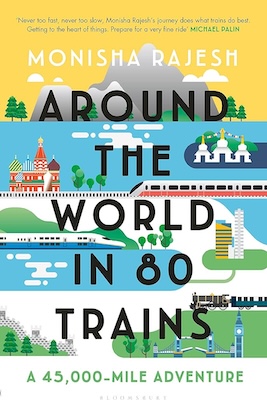
Around the World in 80 Trains by Monisha Rajesh
And finally, after all the mayhem and murder, I want to finish this list with a non-fiction account of an epic globe-spanning journey. Monisha Rajesh takes her backpack and her fiancé Jem and sets off from London on a journey that will stretch for seven months and 45,000 miles, through Europe, Asia, North America and back again. The eighty trains they travel on vary wildly in comfort and indeed safety, but they also offer a kaleidoscope of very human encounters, and a thoughtful and personal commentary on a contemporary world of vastly different lives and experiences. The book doesn’t look away from the challenges and dangers of the journey, but it also made this armchair traveller yearn for the sound of the rails again.




















